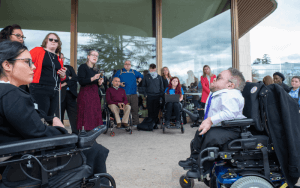
The Mental Welfare Commission for Scotland concluded that the work capability assessment (WCA) process and the subsequent denial of employment and support allowance (ESA) was at least a “major factor in her decision to take her own life”.
The commission’s investigation report – Who benefits? The benefits assessment and death of Ms DE – concluded that the decision to strip her of out-of-work disability benefits had been based on an assessment that contained “insufficient information about her mental health”.
Ms DE killed herself after she was found “fit for work”, following an assessment by Atos Healthcare on behalf of the government.
The Atos assessor, a doctor, had decided she showed “no evidence of significant disability of mental health function”.
But neither her GP nor her psychiatrist, who had both been treating her for 20 years, was asked by Atos or the Department for Work and Pensions (DWP) to comment on her mental health, even though both were convinced that she was not fit for work.
She had been claiming incapacity benefit (IB), but was caught up in the national programme to reassess all IB claimants through the much-criticised WCA process.
Ms DE was found dead in her home on 31 December 2011, 13 days before her ESA was to be stopped. She had told a welfare rights adviser that she did not know how she would be able to pay her mortgage.
Her psychiatrist said there were no other factors he knew of that could have caused her to take her own life.
She was going to have to move onto jobseeker’s allowance, which would have meant a “significant drop in her income”, from £94.25 a week to £67.50.
Dr Donald Lyons, the commission’s chief executive, told Disability News Service: “There was not anything else that we could determine was happening in her life [that could have caused her to kill herself].
“There was evidence that things were getting better for her, [but] she was extremely distressed by the whole process of assessment and being refused ESA.
“Unquestionably, the process and the denial of ESA were certainly at least a major factor in her decision to take her own life.”
The commission concluded that the WCA needed to be “more sensitive to mental health issues”, and that it was “disappointed at how the DWP communicated with Ms DE”.
The case was brought to the commission’s attention because psychiatrists in the area where Ms DE lived “felt that changes in the benefits system were having a major adverse effect on their patients”.
The commission carried out a survey of Scottish psychiatrists to ask them how they thought the WCA had impacted on their patients.
Of the 56 who replied and had patients who had undergone a WCA, three-quarters said they had not been asked for their opinion at any point in the process by either Atos or DWP, while 96 per cent said their patients had been “distressed” by the WCA process.
Two-fifths had at least one patient who had self-harmed following a WCA – partly as a result of the assessment process or outcome – and 13 per cent stated that at least one patient had attempted to take their own life, partly again as a result of the assessment.
More than one-third said that at least one of their patients had been admitted to hospital as a result of the WCA.
The report says: “Commonly reported were increased stress, anxiety and thoughts of suicide. In some cases the stress had severely destabilised patients.”
It adds: “The overall theme of the responses was the distress caused to patients and consequent demands on mental health services.”
The report makes a series of recommendations, particularly for improving the WCA process for claimants with mental health conditions, and for how Atos and DWP must ensure their communication with claimants “is compliant with the requirements of the Equality Act”.
John McArdle, a co-founder of the user-led grassroots campaign group Black Triangle, said the case of Ms DE had disturbing similarities to that of the Scottish poet Paul Reekie, who killed himself in 2010 after being told that his incapacity benefit and his housing benefit were being stopped.
McArdle said: “It is an identical set of circumstances and it is still happening. It is shocking.”
He said it would be four years in June since Reekie’s death. “It is just heart-breaking. The evidence [of connections between people with mental health conditions being found fit for work and then killing themselves] is now in the public domain and it is irrefutable.”
And he said he was appalled by DWP’s response to the commission’s recommendations, in which it insisted that it was “important to retain a balance between the added value of further evidence in any claim for ESA and the demands on the time of GPs and other healthcare professionals”.
McArdle said: “This is a callous way to approach the safety and wellbeing of disabled people who are at risk of suicide.”
27 March 2014

 Seven years on and no progress on disability rights by UK government, says UN
Seven years on and no progress on disability rights by UK government, says UN UN’s ‘damning verdict’ is ‘vindication’ of fightback against government’s rights violations
UN’s ‘damning verdict’ is ‘vindication’ of fightback against government’s rights violations DWP claims it has no written evidence to show why it weakened suicide probe guidance
DWP claims it has no written evidence to show why it weakened suicide probe guidance